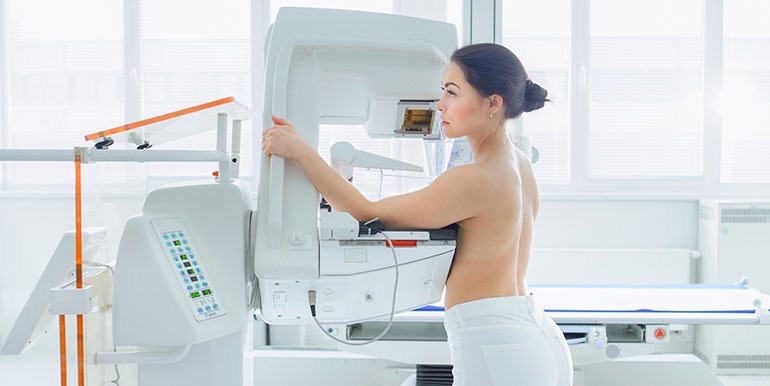Breast cancer screening
14. 11. 2019 | Institute of Biostatistics and Analyses at the Faculty of Medicine of the Masaryk UniversityScreening is a strategy used in a population to detect a disease in individuals without signs or symptoms of that disease. The intention of screening is to identify disease in a community early, thus enabling earlier intervention and management in the hope to reduce morbidity and mortality from a disease.
Image credit: shutterstock.com
However, not all cancer types are suitable for screening; a “suitable” cancer type should meet the following criteria:
- morbidity of this cancer type is relatively high,
- an effective treatment for early stages of this cancer type is available,
- an affordable test exists for the detection of this cancer type.
Main benefits of screening tests involve significant improvements in disease prognosis, together with the prospect of less radical (mostly also less expensive) treatment which, in fact, is usually much more effective. The following screening programmes have proved to be highly effective:
Breast cancer screening consists in regular mammography examinations of asymptomatic women in order to detect a possible malignant tumour of breast at a very early stage. Cancer detected at an early stage can be cured much more easily and effectively, leading to a better quality of patient’s life.
Breast cancer screening in the Czech Republic
The population-based breast screening was officially launched in the Czech Republic in September 2002. It is an open secret, however, that an “opportunistic screening” had already been there before (i.e., preventive examinations of women in some mammography centres at the time of non-existence of official breast screening), whose outcomes have had a significant impact on the interpretation of results of initial stages of the official breast screening.
From the legislative point of view, the project is enshrined in the Decree no. 70/2012 Coll. of MZCR, stipulating the content and intervals of preventive examinations. Specifically, the criteria and conditions for breast screening in the Czech Republic are defined by the Czech Ministry of Health Gazette No. 12/2004.
The Breast Cancer Screening Programme in the Czech Republic follows the recommendation of the Council of the European Union from 2nd November 2003 (2003/878/EC; ![]() PDF file, 93 kB), stating that all EU members should adopt organised screening programmes for breast cancer, cervical cancer and colorectal cancer. The Council of the European Union recommends the collection of data on preventive examination, subsequent diagnostic procedures and final diagnoses. These data should be used to monitor the screening process and the results should be made available to the public and to health professionals. A detailed recommendation for the implementation of cancer screening programmes in individual EU members is provided in the European Guidelines for Quality Assurance in Breast Cancer Screening and Diagnosis (
PDF file, 93 kB), stating that all EU members should adopt organised screening programmes for breast cancer, cervical cancer and colorectal cancer. The Council of the European Union recommends the collection of data on preventive examination, subsequent diagnostic procedures and final diagnoses. These data should be used to monitor the screening process and the results should be made available to the public and to health professionals. A detailed recommendation for the implementation of cancer screening programmes in individual EU members is provided in the European Guidelines for Quality Assurance in Breast Cancer Screening and Diagnosis (![]() PDF file, 159 kB). Data collection from breast screening in the Czech Republic complies with the recommendation of the Council of the European Union, making it possible to monitor the screening programme in a way compatible with the European Guidelines.
PDF file, 159 kB). Data collection from breast screening in the Czech Republic complies with the recommendation of the Council of the European Union, making it possible to monitor the screening programme in a way compatible with the European Guidelines.
The Breast Cancer Screening Programme currently runs in several dozen accredited screening centres whose functioning is monitored and checked according to transparent rules. The programme course, adherence to the stipulated rules, as well as research activities linked to the project are overseen by two independent committees:
- Breast Cancer Screening Committee at the Ministry of Health. This Committee involves representatives of breast radiologists, members of Boards of all expert medical societies involved in the diagnosis and treatment of breast diseases, the State Office for Nuclear Safety (SUJB), the General Health Insurance Company (VZP), the Health Insurance Funds (representing other health insurance companies) and the Czech Ministry of Health.
- Expert Committee on Breast Radiology (KOMD). This Committee involves mainly the representatives of the Czech Radiological Society, the Association of Non-Governmental Radiologists, and the Association of Czech Breast Radiologists (AMA-CZ).
Furthermore, the Association of Czech Breast Radiologists (AMA-CZ) also participates in the organization, management and control of the Breast Cancer Screening Programme in the Czech Republic.
The above-mentioned subjects responsible for the management of screening and diagnosis of breast cancer have agreed with the Czech Ministry of Health to appoint an academic institute responsible for data collection and performance monitoring of the screening programmes through data audit; this role has been attributed to the Institute of Biostatistics and Analyses at the Faculty of Medicine of the Masaryk University (IBA FM MU).
Accredited screening centres
Breast cancer screening currently runs in several dozen accredited centres for screening mammography whose functioning is monitored and checked according to transparent rules. An accredited centre must meet the strict “Criteria and Conditions for the Breast Cancer Screening Programme in the Czech Republic”, as stipulated in the Czech Ministry of Health Gazette No. 02/2007.
klíčová slova: breast cancer screening, Czech Republic, accredited screening centres


